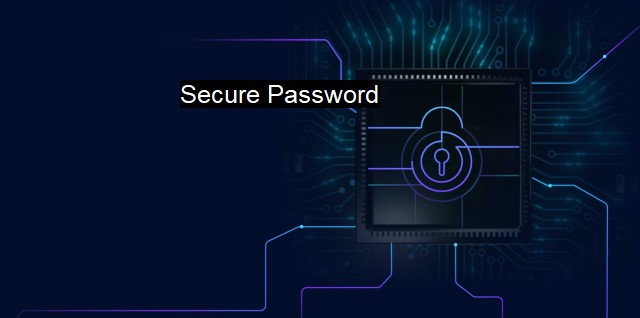What is Secure Password?
The Significance of Secure Passwords in Today's Technology-Driven World: Maintaining Confidentiality and Guarding Against Cyber Attacks
In the realm of cybersecurity and antivirus protection, the concept of a "secure password" plays an integral role in maintaining the integrity and safety of our personalized digital spaces. A secure password can be considered as the first and, often, the most significant line of defense against unauthorized access and malicious activities.A secure password can be described as a string of characters that acts as a key to a digital lock, barring unauthorized persons from accessing your computational devices and their confidential data. It is not just the term that holds a significant value, but the characteristic features that reflect its strength significantly affect how well it can protect you from digital threats.
One primary substantial characteristic of a secure password is its complexity. A simple password such as "123456" or "password" can be easily cracked by a determined cybercriminal employing brute force—a category of software attack and a common dictionary hacking tool in which they try out all possible combinations or popular phrases. Therefore, a secure password must incorporate a blend of lowercase and uppercase letters, numbers, and punctuation marks to increase ambiguity for the intruder.
The length of a password essentially influences its robustness significantly. The longer the password, the harder it is to hurdle because it generates a wide spectrum of possibilities for the cracker to guess. It is typically recommended for a secure password to be at least twelve characters long.
Another crucial factor in setting up a secure password is its uniqueness. Users often make the mistake of reusing their passwords on different accounts. in a scenario where one of the accounts gets breached, it automatically puts the other accounts at risk as well. Hence, a distinctive password for every digital account adds an extensive layer of security to your cyberspace.
Yet another aspect is the frequency of password updates. While it might seem laborious to frequently update passwords, it can substantially mitigate the risk of sustained unauthorized access. Even if a hacker somehow cracks a password, they are less likely to leverage it if it’s regularly changed. users should adopt a careful approach while incorporating this practice and ensure that they are not reusing old passwords or making insignificant changes to the existing ones.
In the digital age where phishing has become staggeringly evolved and assertive, the significance of a password's predictability is often overlooked. Cyber attackers can exploit personal information available online to predict a user's password or answer to their security questions. Safe passwords won't include any personal details, like names, dates, addresses, or any other identifiable information.
The advent of password management tools and two-factor authentication has added new dimensions to the concept of a secure password. Encryption-based password managers can generate and securely store complex, unique passwords for multiple accounts, making it nearly impossible for the intruders to access the encrypted data. Similarly, two-factor authentication corroborates credibility by demanding two types of identification, wherein even if the password is compromised, unauthorized access can still be disallowed.
Secure password practices are gaining prominence because of the evolving cybersecurity environment. As technology users, everyone should reinforce obligation toward acquainting and implementing secure password practices. It takes a suitable measure of caution and care, yet it's a relatively slight price to pay to protect oneself from the impending digital apocalypse stirred by unauthorized access and data breaches.
Therefore a secure password is more than just a password; it's a protective shield against intrusions of privacy, a safeguard against identity theft, and a barrier against potential digital ruin. It's a sophisticated and personalized blend of letters and symbols that when rightly applied executes a sturdy, virtually impermeable security wall between the user and the hacker's wicked endeavors.

Secure Password FAQs
What is a secure password?
A secure password is a combination of upper and lower case letters, numbers, and special characters that are difficult to guess or crack. It should also be at least 8-12 characters long and not contain any easily identifiable personal information.Why is it important to have a secure password?
It is important to have a secure password because cybercriminals use automated tools to guess passwords and gain unauthorized access to your devices and online accounts. A weak password makes it easier for them to guess and compromise your information, putting your identity and financial information at risk.How can I create a strong password?
You can create a strong password by using a combination of upper and lower case letters, numbers, and special characters. You should also avoid using easily identifiable personal information or common words. Consider using a passphrase or acronym that is easy for you to remember, but difficult for others to guess.Do I need to change my password regularly?
Yes, it is recommended to change your password regularly to ensure the security of your accounts. Cybercriminals often use stolen passwords to gain access to accounts long after the initial attack. Changing your password regularly can limit the amount of time a cybercriminal has to use a stolen password to access your accounts.| | A | | | B | | | C | | | D | | | E | | | F | | | G | | | H | | | I | | | J | | | K | | | L | | | M | |
| | N | | | O | | | P | | | Q | | | R | | | S | | | T | | | U | | | V | | | W | | | X | | | Y | | | Z | |
| | 1 | | | 2 | | | 3 | | | 4 | | | 7 | | | 8 | | |||||||